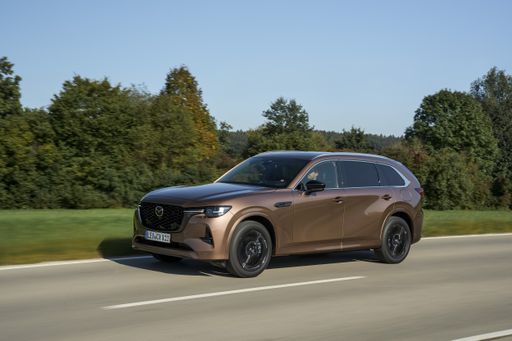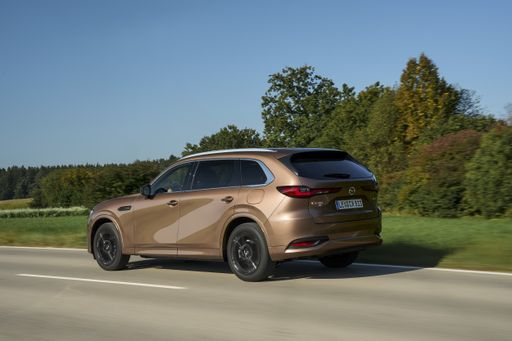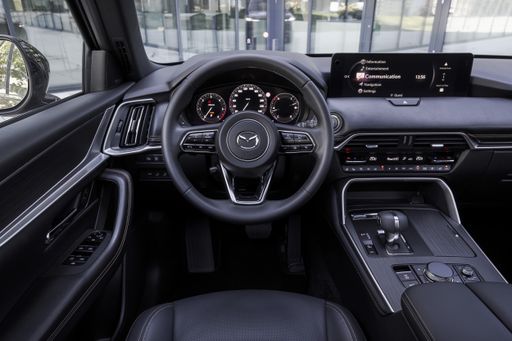Mazda CX-80 vs VW Transporter Transporter – Differences & prices compared
Compare performance, boot space, consumption and price in one view.
Find out now: which car is the better choice for you – Mazda CX-80 or VW Transporter Transporter?
The Mazda CX-80 (SUV) comes with a Plugin Hybrid or Diesel MHEV engine and Automatic transmission. In comparison, the VW Transporter Transporter (Cargo Van) features a Diesel, Plugin Hybrid or Electric engine with Manuel or Automatic transmission.
When it comes to boot capacity, the Mazda CX-80 offers 258 L, while the VW Transporter Transporter provides – depending on how much space you need. If you’re looking for more power, decide whether the 327 HP of the Mazda CX-80 or the 286 HP of the VW Transporter Transporter suits your needs better.
In terms of consumption, the values are 1.60 L per 100 km for the Mazda CX-80, and 21.90 kWh7.10 L for the VW Transporter Transporter.
Price-wise, the Mazda CX-80 starts at 48200 £, while the VW Transporter Transporter is available from 37500 £. Compare all the details and find out which model fits your lifestyle best!
Mazda CX-80
The Mazda CX-80 exemplifies a perfect blend of sophisticated design and dynamic performance, making it a standout model in the SUV market. With its sleek lines and contemporary interior, it delivers a sense of luxury typically reserved for higher-end marques. This model also offers impressive handling and a comfortable ride, ensuring an enjoyable driving experience in various conditions.
details @ newsroom.mazda.com
@ newsroom.mazda.com
 @ newsroom.mazda.com
@ newsroom.mazda.com
 @ newsroom.mazda.com
@ newsroom.mazda.com
VW Transporter Transporter
The VW Transporter, a versatile favourite among commercial vehicles, combines practicality with modern design. Its spacious interior offers ample room for both passengers and cargo, making it a reliable choice for businesses and families alike. The vehicle's strong build and advanced technology ensure a smooth and efficient driving experience in various conditions.
details

|
|
|
|
|
Costs and Consumption |
|
|---|---|
|
Price
48200 - 60200 £
|
Price
37500 - 60800 £
|
|
Consumption L/100km
1.6 - 5.8 L
|
Consumption L/100km
7.1 - 8.4 L
|
|
Consumption kWh/100km
-
|
Consumption kWh/100km
21.9 - 24.4 kWh
|
|
Electric Range
61 km
|
Electric Range
56 - 331 km
|
|
Battery Capacity
-
|
Battery Capacity
11.8 - 63.8 kWh
|
|
co2
35 - 151 g/km
|
co2
0 - 220 g/km
|
|
Fuel tank capacity
70 - 74 L
|
Fuel tank capacity
55 L
|
Dimensions and Body |
|
|---|---|
|
Body Type
SUV
|
Body Type
Cargo Van
|
|
Seats
7
|
Seats
2 - 5
|
|
Doors
5
|
Doors
4 - 5
|
|
Curb weight
2131 - 2240 kg
|
Curb weight
1872 - 2462 kg
|
|
Trunk capacity
258 L
|
Trunk capacity
-
|
|
Length
4995 mm
|
Length
5050 - 5450 mm
|
|
Width
1890 mm
|
Width
2032 mm
|
|
Height
1714 mm
|
Height
1966 - 1985 mm
|
|
Payload
649 - 650 kg
|
Payload
755 - 1259 kg
|
Engine and Performance |
|
|---|---|
|
Engine Type
Plugin Hybrid, Diesel MHEV
|
Engine Type
Diesel, Plugin Hybrid, Electric
|
|
Transmission
Automatic
|
Transmission
Manuel, Automatic
|
|
Transmission Detail
Automatic Gearbox
|
Transmission Detail
Manual Gearbox, Automatic Gearbox
|
|
Drive Type
All-Wheel Drive
|
Drive Type
Front-Wheel Drive, All-Wheel Drive, Rear-Wheel Drive
|
|
Power HP
254 - 327 HP
|
Power HP
110 - 286 HP
|
|
Acceleration 0-100km/h
6.8 - 8.4 s
|
Acceleration 0-100km/h
7.4 - 16.9 s
|
|
Max Speed
195 - 219 km/h
|
Max Speed
112 - 150 km/h
|
|
Torque
500 - 550 Nm
|
Torque
310 - 415 Nm
|
|
Number of Cylinders
4 - 6
|
Number of Cylinders
4
|
|
Power kW
187 - 241 kW
|
Power kW
81 - 210 kW
|
|
Engine capacity
2488 - 3283 cm3
|
Engine capacity
1996 - 2488 cm3
|
General |
|
|---|---|
|
Model Year
2024
|
Model Year
2025
|
|
CO2 Efficiency Class
B, E
|
CO2 Efficiency Class
G, A
|
|
Brand
Mazda
|
Brand
VW
|
Mazda CX-80
Introduction to the Mazda CX-80: A Leap into the Future
The Mazda CX-80 emerges as a significant player in the SUV segment, boasting a fusion of cutting-edge technology, performance excellence, and modern design. Available in various configurations, the CX-80 seeks to deliver an exhilarating driving experience while catering to diverse consumer needs. This model bridges the gap between luxury and practicality, making it a standout in the competitive SUV market.
Power and Performance: More Than Just Numbers
The Mazda CX-80 is available with two main powertrain options: the innovative PlugIn-Hybrid and the efficient Diesel Mild-Hybrid. Ranging from 254 to 327 PS, these engines combine with an all-wheel drive and automatic transmission to deliver both power and smooth performance. The hybrid model boasts an impressive consumption rate of only 1.6 L/100km and offers an electric range of 60 km. The diesel variant offers a balanced approach with a consumption rate of 5.7 L/100km. Acceleration from 0-100 km/h takes between 6.8 to 8.4 seconds, depending on the variant.
Dynamic Design and Dimensions
The Mazda CX-80's aesthetic is both sophisticated and assertive. With a length of 4,995 mm, a width of 1,890 mm, and a height of 1,714 mm, the CX-80 provides ample space without compromising on style. This spaciousness extends to the interior, which comfortably accommodates seven passengers. The boot space, starting at 258 litres, caters to various storage needs, making it ideal for family trips and daily commuting alike.
Technological Innovations in Safety and Comfort
Inside, the CX-80 showcases an array of technological advancements. These include intuitive infotainment systems and advanced driver assistance features, ensuring safety and convenience. The SUV is equipped with a comprehensive suite of safety technologies, including adaptive cruise control, lane-keeping assist, and automated emergency braking, aligning with Mazda's commitment to vehicle safety and passenger protection.
Luxury Meets Practicality with Trim Options
Buyers of the Mazda CX-80 can select from several trim lines such as the Exclusive-Line AWD Automatik, Homura AWD Automatik, Homura Plus AWD Automatik, Takumi AWD Automatik, and Takumi Plus AWD Automatik. Each trim offers unique features and luxury touches, allowing customers to tailor the vehicle to their preferences and lifestyle needs.
Eco-Efficiency and Economic Considerations
Taking environmental impact into account, the Mazda CX-80 features different CO2 efficiency classes ranging from B to E, with emissions between 35 to 148 g/km. This eco-friendly consideration does not detract from its performance, enabling Mazda to provide a responsible yet thrilling driving experience. Moreover, the price range between €55,350 and €69,350 reflects the vehicle's premium positioning and advanced features.
Conclusion: The CX-80 as a Trailblazer
The Mazda CX-80 is not just a vehicle; it represents Mazda's vision for the future. Combining superior performance, advanced technology, and sophisticated design, the CX-80 sets new standards in the SUV segment. It caters to those who seek luxury and efficiency without compromise, making it a worthy addition to any discerning driver's garage.
VW Transporter Transporter
Revolutionizing Utility: The VW Transporter T7
The latest iteration of the VW Transporter, known widely as the Transporter T7, marks a significant evolution in utility vehicle design and functionality. As a mainstay in the VW lineup, the Transporter T7 comes with a plethora of options, ensuring that it meets a variety of professional and personal needs.
Diverse Models to Fit Every Need
For 2025, the VW Transporter T7 is available in multiple configurations, ranging from efficient diesel engines to innovative hybrid systems. The conventional models are powered by a 2.0 TDI diesel engine, offering three power outputs: 110 HP, 150 HP, and a vigorous 204 HP. For those seeking a more sustainable option, the 2.5 eHybrid model provides a combined power output of 233 HP with an electric range of 56 km, thanks to its 11.8 kWh battery.
Innovative Technical Aspects
Underpinning the technical innovations of the Transporter T7 is VW's dedication to cutting-edge engineering. The diesel engines provide torque ranging from 310 Nm up to 390 Nm, ensuring robust performance across the lineup. Moreover, the T7 offers configurations with either manual or automatic gearboxes, catering to different driving preferences.
The availability of front-wheel drive and the 4MOTION all-wheel-drive system across the range enhances versatility, allowing the Transporter T7 to tackle various terrains with ease. With body lengths extending to 5450 mm and a payload capacity of up to 1259 kg, the Transporter T7 stands as a paragon of practicality for transporting goods or accommodating passengers.
Comfort and Design Revolution
Beyond performance, the VW Transporter T7 has been designed with driver comfort and ergonomic efficiency in mind. The cabins offer ample seating configurations, supporting both two-seat and five-seat layouts. The inclusion of modern conveniences elevates the driving experience, making long hauls more manageable and stress-free.
The exterior dimensions, with a width of 2032 mm and a height up to 1969 mm, marry the classic robust design with a contemporary touch, making the Transporter T7 a visual centerpiece in any fleet.
Economical and Environmental Impact
Economic efficiency is another critical aspect of the VW Transporter T7's design philosophy. With diesel fuel tank capacities between 55 and 63 liters, and an emphasis on improving mileage with each engine variant, operational costs are kept at a minimum. Additionally, the eHybrid model not only offers environmental benefits but also presents substantial savings on fuel through its electric range capability.
Conclusion: The Transporter T7 Legacy Continues
The VW Transporter T7 furthers the legacy of its predecessors by combining practicality, innovation, and eco-friendliness. Whether utilized for business in its cargo van capacity or adapted for personal use with seating comforts, the Transporter T7 is set to remain a critical player in the automotive sector, pushing the boundaries of what a multi-purpose van can achieve.
Which drive types are available for the Mazda CX-80?
Available as All-Wheel Drive.
The prices and data displayed are estimates based on German list prices and may vary by country. This information is not legally binding.
